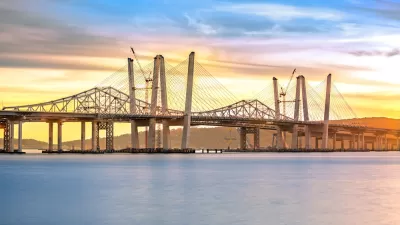The federal government approved a streamlined process to expedite the bridge's replacement. Key would be to remove transit plans for the new bridge, thus keeping costs down, but that has raised questions about not providing alternatives to driving.
The 1955 cantilever bridge is costing NY $100 million annually in repairs. Plans for its replacement or repair have long been in the works.
"Citing the bridge's deteriorating condition, the federal Department of Transportation decided it would let the state go forward with the project as long as it streamlined its earlier plan to make a new bridge a centerpiece of a $21 billion, 30-mile transportation corridor. The federal agency said it would help speed up the process for the state to build a $5.2 billion eight-lane bridge, to which mass transit could be added in the future."
"But it is not clear how much the construction may cost commuters. Jeffrey M. Zupan, a senior fellow for transportation with the Regional Plan Association, said issuing the bonds for $3 billion would mean an increase on the bridge's toll. The toll, now $5, could be raised by as much as $10 each year for the duration of the project, Mr. Zupan said. At the same time, commuters have no immediate alternatives.
"What they're basically saying to the driver is, ‘We're going to raise your toll and by the way we're not going to improve public transit,' " Mr. Zupan said. "And we're not going to give you an option other than driving."
From lohud.com: Tappan Zee Bridge project details to be unveiled at Oct. 25, 27 briefings: "By assuming the dominant role, the Federal Highway Administration will help speed up the review and approval of the project, which will no longer consider rail and bus rapid transit services along Interstate 287 through Rockland and Westchester. This will allow it to focus on building a new span over the Hudson River."
FULL STORY: U.S. Says It Will Expedite Approval to Replace Deteriorating Tappan Zee Bridge

Planetizen Federal Action Tracker
A weekly monitor of how Trump’s orders and actions are impacting planners and planning in America.

Chicago’s Ghost Rails
Just beneath the surface of the modern city lie the remnants of its expansive early 20th-century streetcar system.

San Antonio and Austin are Fusing Into one Massive Megaregion
The region spanning the two central Texas cities is growing fast, posing challenges for local infrastructure and water supplies.

Since Zion's Shuttles Went Electric “The Smog is Gone”
Visitors to Zion National Park can enjoy the canyon via the nation’s first fully electric park shuttle system.

Trump Distributing DOT Safety Funds at 1/10 Rate of Biden
Funds for Safe Streets and other transportation safety and equity programs are being held up by administrative reviews and conflicts with the Trump administration’s priorities.

German Cities Subsidize Taxis for Women Amid Wave of Violence
Free or low-cost taxi rides can help women navigate cities more safely, but critics say the programs don't address the root causes of violence against women.
Urban Design for Planners 1: Software Tools
This six-course series explores essential urban design concepts using open source software and equips planners with the tools they need to participate fully in the urban design process.
Planning for Universal Design
Learn the tools for implementing Universal Design in planning regulations.
planning NEXT
Appalachian Highlands Housing Partners
Mpact (founded as Rail~Volution)
City of Camden Redevelopment Agency
City of Astoria
City of Portland
City of Laramie



























